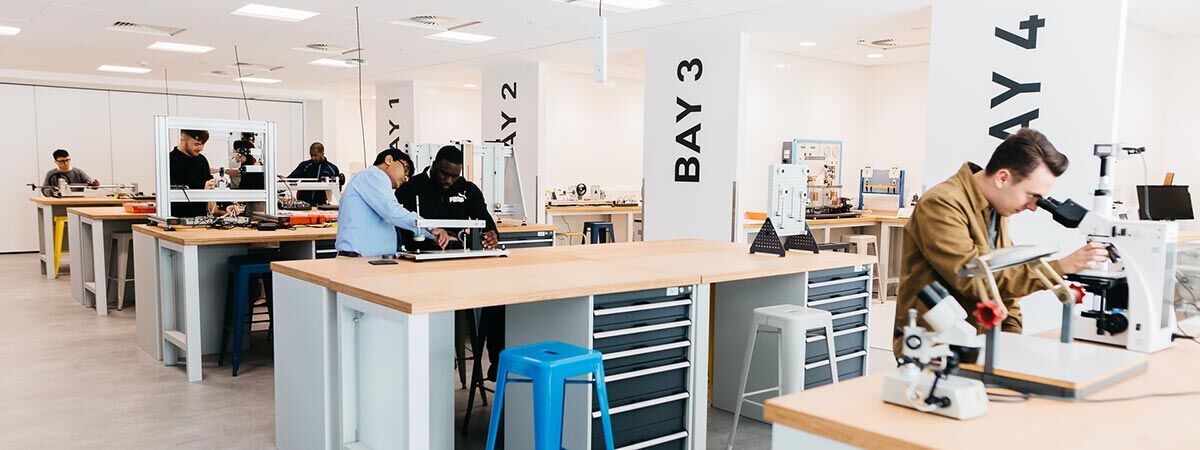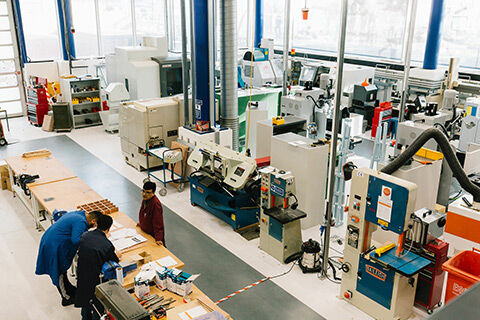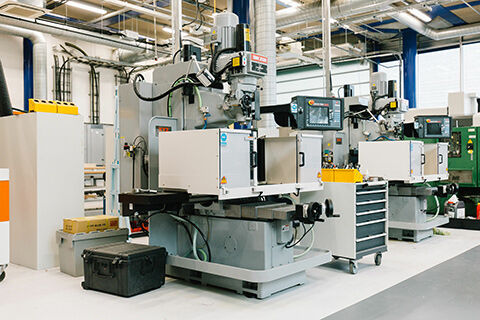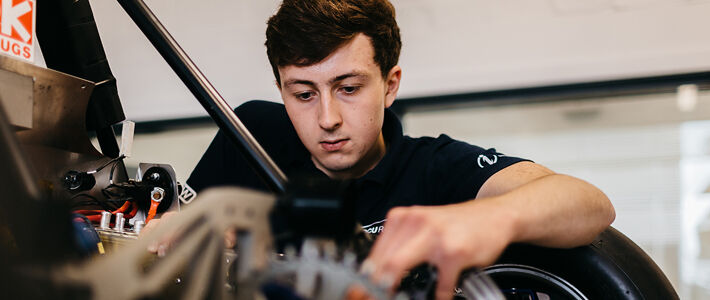
Automotive Engineering - MSc
Currently viewing course to start in 2026/27 Entry.
Our MSc Automotive Engineering course will teach you the skills you need to become a highly skilled engineer, capable of undertaking related tasks within and across different organisations. Overall the course aims to produce skilled engineers capable of undertaking automotive engineering tasks within and across organisations utilising the latest tools and technologies....
Learn more about this course
Speak to the course tutor
We are offering online 1-1 sessions between February and April, so you can talk to one of the course tutors at a time of your choice. This is your opportunity to find out more about the course and get your questions answered.
- Level Postgraduate Taught
- Study mode Full Time/Part Time
- Award MSc
- Start date September 2026, January 2027
- Fees View course fees
- Subject
- Location City Centre
This course is:
Available with Professional Placement option
Open to International Students
Overview
Our MSc Automotive Engineering course will teach you the skills you need to become a highly skilled engineer, capable of undertaking related tasks within and across different organisations.
Overall the course aims to produce skilled engineers capable of undertaking automotive engineering tasks within and across organisations utilising the latest tools and technologies. The course will encourage the application and development of modern engineering solutions to the problems of fuel efficiency and emissions abatement, as well as the improvement of vehicle performance and stability.
The course explores the wider context of sustainability and climate change, as well as the specific application of advanced control techniques to solve problems through research led powertrain and vehicle system specific modules.
What's covered in this course?
The Masters in Automotive Engineering course will encourage creative thinking and the development of engineering leadership skills, as well as teaching you how to solve problems through research. You’ll engage in independent study, advancing your understanding and developing new skills. The Master’s project provides an opportunity for you to apply this learning to the solution of particular industry problems. These have been regularly showcased at industry events hosted by the course team over the last 12 years, and several of these have matured into doctoral projects.
The course has achieved academic accreditation from the IMechE and IET. This accreditation has been maintained not only in recognition for demonstrating that key principles have been incorporated and integrated into the curriculum design and module development of the course, but also for actively seeking industry and sector wide input in both the design and delivery of these modules.
The lecturing staff have an extensive experience in the automotive industry and academia in design, powertrain, control, computer modelling and simulation, business, supply and logistics.
Exciting opportunities include the option of participating in the Formula Student event. Every over 100 universities from all over the world design and build their own race car and compete in a July race event over a weekend at the world famous Silverstone race track. There is expected to be continuing demand for competent, versatile postgraduates who can design and implement innovative solutions for industry, and therefore this Engineering MSc course gives you an opportunity to pursue a career as a professional automotive engineer, general engineer and more.
In addition to further academic research opportunities, career prospects are expected to keep pace with the rapid advances in computer aided methods and intelligent technologies, hence, there is expected to be continuing demand for competent, versatile postgraduates who can design and implement innovative solutions using the industry standard software and hardware available to us on site.
Professional Placement option
This course offers an optional professional placement. This allows you to spend 20 weeks with an employer, following completion of your taught modules, and is a great way to enhance your employability.
The experience you gain through your placement will allow you to evidence your professional skills, attitudes and behaviours at the point of entry to the postgraduate job market.
If you choose the placement option, you will be responsible for finding and securing a suitable placement to complement your chosen area of study. You will be able to draw on the University’s extensive network of local, regional and national employers, and the support of our Careers teams. If you do not secure a suitable placement, you will automatically be transferred back to the standard, non-placement version of the course.
Please note: Placements will only be confirmed following a competitive, employer-led selection process. As such, the University will not be able to guarantee placements for students who have registered for the professional placement option.
Accredited By
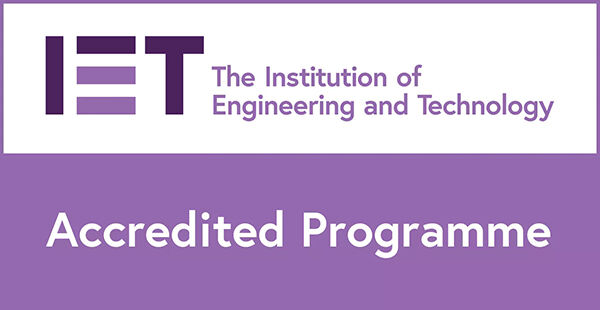
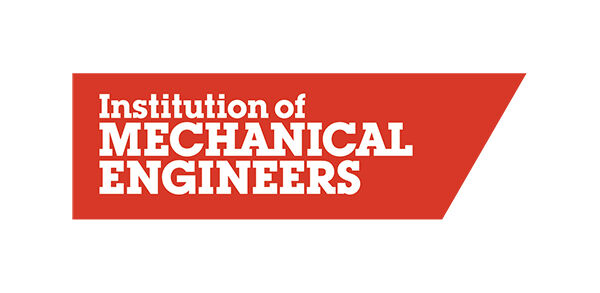
Why Choose Us?
- Accredited course- This course is accredited by IMechE and IET. Students completing this degree will be in a strong position to pursue professional engineering status*.
- State-of-the-art facilities - Our state-of-the-art laboratories will enhance your educational experience, providing a bridge between theoretical learning and hands-on teaching to prepare you for a career in industry.
- Develop interpersonal skills – You'll gain the interpersonal skills necessary to liaise and work in teams, structuring your work and meeting the varying demands of the workplace.
- Problem-based learning - You will be able to apply real-life problem-based learning to industry and commerce, while also learning new technologies and techniques to solve global engineering problems.
- Employable Graduates - Our graduates have gone on to complete further academic research/study, commercial research and development, powertrain development engineering in the automotive industry, and design and performance engineering. Graduates have secured roles with companies such as Rolls Royce LTD.
- Access to latest tools and technologies - You will work on industry-standard advanced analytical tools such as Matlab/Simulink, CATIA, Ansys and ADAMS Mechanism, and use our world class electric vehicle powertrain test cell.
Important Course Accreditation Information*
Students completing an IMechE or IET accredited degree are deemed to have met part or all of the academic requirements for registration as a Chartered or Incorporated Engineer and are in a strong position to move on to achieve professional engineering status after a period of initial professional development in industry.
The accredited MSc will meet, in part, the exemplifying academic benchmark requirements for registration as a Chartered Engineer. Accredited MSc graduates who also have a BEng (Hons) accredited for CEng will be able to show that they have satisfied the educational base for CEng registration.
It should be noted that graduates from an accredited MSc programme that do not also have an appropriately accredited Honours degree, will not be regarded as having the exemplifying qualifications for professional registration as a Chartered Engineer with the Engineering Council; and will need to have their qualifications individually assessed through the Individual Case Procedure if they wish to progress to CEng.
Where our students go
Our students have gone on to work with companies such as:
- Rolls Royce LTD
And in jobs such as:
- Manufacturing Engineer Capability Acquisitions
Entry Requirements
Essential requirements
Applicants are normally expected to have a minimum of a 2:2 degree, or equivalent, in automotive, mechanical, electrical, electronic or manufacturing engineering. We will also accept related subjects such as physics or materials, or evidence of fundamental knowledge in mechanics and dynamics.
Applying with international qualifications
See below for further information on applying as an international student.
If you have a qualification that is not listed, please contact us.
Fees & How to Apply
UK students
Annual and modular tuition fees shown are applicable to the first year of study. The University reserves the right to increase fees for subsequent years of study in line with increases in inflation (capped at 5%) or to reflect changes in Government funding policies or changes agreed by Parliament. View fees for continuing students.
Award: MSc
Starting: Sep 2026
- Mode
- Duration
- Fees
- Full Time
- 12 months
- £11,200 in 2026/27
- Full Time
- 18 months (with Professional Placement)
- £12,320 in 2026/27
- Part Time
- 20 months
- Show fees
- £1245 per 20 credits
- Year 1 - 80 credits
- Year 2 - 100 credits
Fees for Part-time students
This course can be studied on a Part-time study basis. The cost per year of study is based on credit requirements for that year.
Award: MSc
Starting: Jan 2027
- Mode
- Duration
- Fees
- Full Time
- 12 months
- £11,200 in 2026/27
- Full Time
- 18 months (with Professional Placement)
- £12,320 in 2026/27
- Part Time
- 28 months
- Show fees
- £1245 per 20 credits
- Year 1 - 80 credits
- Year 2 - 100 credits
Fees for Part-time students
This course can be studied on a Part-time study basis. The cost per year of study is based on credit requirements for that year.
International students
Annual and modular tuition fees shown are applicable to the first year of study. The University reserves the right to increase fees for subsequent years of study in line with increases in inflation (capped at 5%) or to reflect changes in Government funding policies or changes agreed by Parliament. View fees for continuing students.
Award: MSc
Starting: Sep 2026
- Mode
- Duration
- Fees
- Full Time
- 12 months
- £18,970 in 2026/27
- Full Time
- 18 months (with Professional Placement)
- £20,865 in 2026/27
Award: MSc
Starting: Jan 2027
- Mode
- Duration
- Fees
- Full Time
- 12 months
- £18,970 in 2026/27
- Full Time
- 18 months (with Professional Placement)
- £20,865 in 2026/27
Application deadlines
We advise you to apply early to allow sufficient time for you to prepare to start your studies. Please apply by Friday 17 July for a September start or Friday 4 December for a January start to allow time to arrange accommodation, student finance and visas where required.
Late applications will be accepted where places are still available.
To find out more, see our application timeline.
Personal statement
You’ll need to submit a personal statement as part of your application for this course. This will need to highlight your passion for postgraduate study – and your chosen course – as well as your personal skills and experience, academic success, and any other factors that will support your application for further study.
If you are applying for a stand alone module, please include the title of the module you want to study in your Personal Statement.
Not sure what to include? We’re here to help – take a look at our top tips for writing personal statements and download our free postgraduate personal statement guide for further advice and examples from real students.
Course in Depth
Module
In order to complete this course a student must successfully complete all the following CORE modules (totalling 180 credits):
You will analyse, model and simulate state of the art alternative power units, such as petrol and diesel engines, the impact of alternative fuels/ hybrid systems. Controllers may then be designed for required emissions regulation, fuel economy, and performance. In particular, the potential exists for the application of modern controllers to coordinate and control APUs and their associated subsystems.
This module offers you an opportunity to model, control and design vehicles using modern simulation and control strategies within an appropriate software environment for ABS, active suspension, power steering and stability systems.
This module provides you with an awareness of advanced structural techniques used for study of deformable solids, a general knowledge of the techniques employed and skills to perform analysis for selected solid components and structures. It aims to provide you with the following: the skills and confidence to perform advanced analysis of solid components and structures; the knowledge of selected advanced analysis techniques employed on the more common components and structures; and an understanding of the behaviour of solids under two or three dimensional stress fields, and the limitations imposed by assumptions and boundary conditions.
The Automotive and Mechanical Engineering programmes share the common philosophy of one which aims to provide engineers with a rigorous grounding in industrial standard design, analysis and simulation capability. This module is consistent with this approach since it directly includes content and resources that specifically help you meet these needs.
A principal aim of both programmes is to respond to the market need for engineers who are competent and skilled in the use of advanced computer modelling and simulation techniques. This module delivers against this aim, providing you with a thorough technology grounding supported by directly relevant design, simulation and analysis experiences.
The module utilises the mathematical concepts such as transform calculus and matrix theory used to model systems using both the transfer function and state-space paradigms. You will then be able to design controllers for linear systems using time and frequency response methods, in particular, pole placement techniques will be applied using both input-output and state-feedback approaches. These will then be extended to observer design and LQR optimization.
Teaching and assessment will comprise not only of traditional lectures and tutorials, but also the use of industry standard software for problem solving.
The module aims to provide you with a foundation for academic research skills employed in all modules, but particularly the master’s dissertation. This will enhance your learning experience providing a research output which is both industrially relevant, and contributes academic value to the research base of your chosen industry.
The purpose of the module is to enable you to undertake a sustained, in-depth and research-informed Level 7 project exploring an area that is of personal interest to you. In agreement with your supervisor, you will decide upon your topic which will take the form of a practical outcome (artefact) with accompanying contextual material. The main consideration when choosing your topic is that it must be aligned to the programme you are studying and informed by the research strategy of your school, and you should consider the relevance of this topic to your future academic or professional development.
Professional Placement
In order to qualify for the award of MSc Automotive Engineering with Professional Placement, a student must successfully complete all of the Level 7 modules listed above as well as the following Level 6 module:
This module is designed to provide you with the opportunity to undertake a credit bearing, 20-week Professional Placement as an integral part of your Master’s Degree.
The purpose of the Professional Placement is to improve your employability skills which will, through the placement experience, allow you to evidence your professional skills, attitudes and behaviours at the point of entry to the postgraduate job market. Furthermore, by completing the Professional Placement, you will be able to develop and enhance your understanding of the professional work environment, relevant to your chosen field of study, and reflect critically on your own professional skills development within the workplace.
Download course specification
Download nowKnowledge and understanding are acquired though formal lectures, tutor-led seminars and practical activities, and a range of independent learning activities. Emphasis is placed on guided, self-directed and student-centred learning with a progressively increasing independence of approach, thought and process. This independent learning includes an element of peer review in order to evaluate the effectiveness of the learning.
Lectures are used to introduce themes, theories and concepts, which are further explored in seminars. Technology enhanced learning is used, where appropriate, through the provision of online resources, discussion forums and other activities. Analytical and problem-solving skills are further developed using a range of appropriate 'real' and 'theoretical' case studies and problem-based learning scenarios.
You will be supported by a personal tutor based at the University, who will see you for regular one-to-one meetings. These meetings will generally take place at the beginning of each semester and at the end of the academic year.
The course has an emphasis on active and participative education, including practical learning, problem-based learning and group work, which will develop their skills of analysis, synthesis, decision making and the ability to cope with new and unfamiliar problems.
A range of assessment methods are employed with associated assessment criteria. Knowledge and skills are assessed, formatively and summatively, by a number of methods such as coursework, examinations (seen and unseen, open and closed-book), presentations, practical assignments, vivas, online forums, podcasts, and project work.
Employability
Enhancing your employability skills
This course aims to provide you with an advanced understanding of modern automotive systems and processes, and their application within industry. It will relate to the requirements of new global, environmental infrastructure and economic drivers.
There is high demand throughout the automotive industry for engineers who can demonstrate that they have both a detailed academic knowledge and advanced practical skills. Employers are also keen to employ people who can design and analyse complex systems and components within the automotive engineering environment.
Facilities & Staff
Our Facilities
Our state-of-the-art Engineering labs and workshops provide the perfect setting for practical work with modern-day teaching and learning facilities. We pride ourselves on equipping our students with the skill set that they need not only working on industry standard equipment, but having industrial links, which set them up perfectly for a career in engineering.
We have invested in industry-standard facilities to support the practice-based elements of our Engineering courses and give students as much practical learning as possible, to prepare for industry placements and job opportunities after graduation. Students have access to our facilities during classes, and can book out of class sessions with our specialist technicians.
We are a partner of the Greater Birmingham and Solihull Institute of Technology (GBSIoT) and have secured £1.1 million of government funding for investment in brand-new equipment and facilities. Funding of £808,000 from the Department for Education has supported our development of an Electric Vehicle (EV) Test Rig, an Additive Manufacturing Machine (3D printer) and a material testing-split zone furnace.
The IoT has enabled procurement of new technologies for material testing, electronics prototyping and production and 3D scanning to compliment computer aided design for manufacture.
